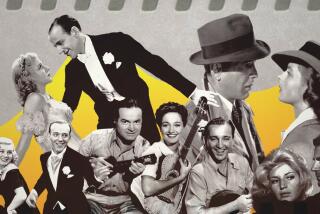From RFD to Radio, TV, Progress Draws Us Apart
- Share via
Every improvement in the technology of communications during the last century has led to greater isolation among people. It is a remarkable paradox, as if every improvement in the technology of hygiene had led to greater illness, every improvement in the technology of transportation to greater distance.
It began with Rural Free Delivery that brought the mail to the person. Before RFD, the person had to come to the mail, which was deposited for him at a centralized place. Usually the place was a general store; usually the person was a farmer who would kill two birds with one stone, picking up his mail at the same time he shopped for groceries and supplies.
Three birds. He would also socialize, visit with the other farmers and their families who were at the general store for the same reasons. And this was one of the few chances such people had to pass time with their neighbors; their farms were many miles apart and their days too busy with chores to allow for casual dropping-in.
It was a lonely life. Ironically, the inefficiency of the postal system made it less so. With the efficiency of Rural Free delivery came more time to sow and reap, milk and feed. But something else came as well: the death of the general store as a social institution. As historian Daniel Boorstin wrote, “From every farmer’s doorstep there now ran a highway to the world. But at the price of dissolving the old face-to-face communities.”
The paradox had begun.
Radio continued it. Radio brought into the home forms of entertainment and information that had never been available in the home before. But, like Rural Free Delivery, it also brought the death of a social institution--in this case, the Chautauqua movement.
The Chautauqua movement was a name encompassing a wide variety of live shows featuring lecturers and comedians, musicians and acrobats. For the most part, the movement played the small towns of America, giving people in those towns one of the few chances they had to assemble in Boorstin’s face-to-face communities.
But it could not compete with radio. Why should people go out to a concert when the concert would come into their homes? Why should musicians travel around the country when they could just go to the radio studio and let the air waves do the walking?
The telephone was a novelty in the 1880s, a necessity half a century later. It made possible conversation between people who were too far apart to have a conversation any other way. But it also created, in New York University Professor Neil Postman’s words, “a strange world of acoustic space in which disembodied voices exchange information intimately and in specially developed personas.” In other words, it got us deeper into the habit of communicating without being face-to-face. It isolated us at the same time that it helped us break out of our isolation.
Television, of course, has created effects only exacerbated by the home video industry. Before considering television in some detail, let’s look at the home computer.
The computer can do so many things people used to do for themselves that people have begun to think of computers as selves. Consider the following, a paragraph from a book called “The Media Lab,” by Stewart Brand:
“The most surprising and consistent quality in electronic-mail communities is the human warmth they develop. They are a form of conversation. An author named Howard Rheingold was asked what he liked most about a regional computer teleconference system in San Francisco, and he explained the permanent temptation to log in: ‘There’s always another mind there. It’s like having the corner bar, complete with old buddies and delightful newcomers and new tools waiting to take home and fresh graffiti and letters, except instead of putting on my coat, shutting down the computer, and waking down to the corner, I just invoke my telecom program and there they are. It’s a place.’ ”
Remember when people used to want to relate? Rheingold is the new wave: He wants to invoke a telecom program.
Postman, mentioned earlier, is the author of a brilliant book called “Amusing Ourselves to Death: Public Discourse in the Age of Show Business” (Viking). In it he postulates something that would have startled George Orwell. He says that Big Brother is here, all right--it’s 1988, after all--but he is not spying on us. We are reporting in to him. Big Brother is not an interloper in our society, he’s a guest. We invited him. We like him. We want him to offer us sandwiches.
In “Walden,” Thoreau wrote, “Lo! Men have become the tools of their tools.”
And so we have.
The tool with which I am most familiar is television, a medium that has, for purposes of this argument, two salient characteristics: the size of its images and its location in the house.
Let me compare watching television with going to the movies:
The latter is an event--a common one, to be sure, but an event nonetheless. We have to do some planning (perhaps arrange for a baby sitter) and exert some effort (drive a certain distance and search for a parking space) to make it happen.
Psychologically, the size of images on a movie screen creates distance between the moviegoer and the actor, making them almost Olympian to us. For this reason, whatever else we feel for these men and women on the screen, we do not feel familiarity. We are not misled into believing we have some kind of relationship with these people.
We are, however, misled by TV images-- by the fact that they are small and in our living rooms. We become perversely comfortable with them; we begin to think of them as friends. Our relationship with celebrities, as film critic Richard Schickel has written, was once based on real distance. It is now based on imagined proximity. The TV images are the friends of our technologically imposed isolation.
It is no accident that the increasing popularity of television roughly parallels the breakup of the nuclear family. Not that the former has caused the latter, not at all. The former has become the palliative for the latter.
This is no outrageous generalization. Is the 6 o’clock news popular because there are great numbers of people who care what cliches the candidates uttered today, what stores were robbed, what fenders bent? Or is its popularity more a function of the companionship it provides than the information? Dad might not be home for dinner tonight but the local news team will be there. The local news team is always there. They console us about the tragic stories, chuckle along with us at the funny ones, share our frustration at the weather. They are our extended family.
Thus television has pushed us deeper into our isolation at the same time it provides the images that delude us into believing we are gregarious. The absurdity of this situation is illustrated by a joke told by Boorstin about a woman who has just become a mother and another woman who is her friend. The friend says, “My, that’s a beautiful baby you have.” The mother says: “Oh, that’s nothing. You should see his picture.”
Bring back the general store.
More to Read
Sign up for Essential California
The most important California stories and recommendations in your inbox every morning.
You may occasionally receive promotional content from the Los Angeles Times.













